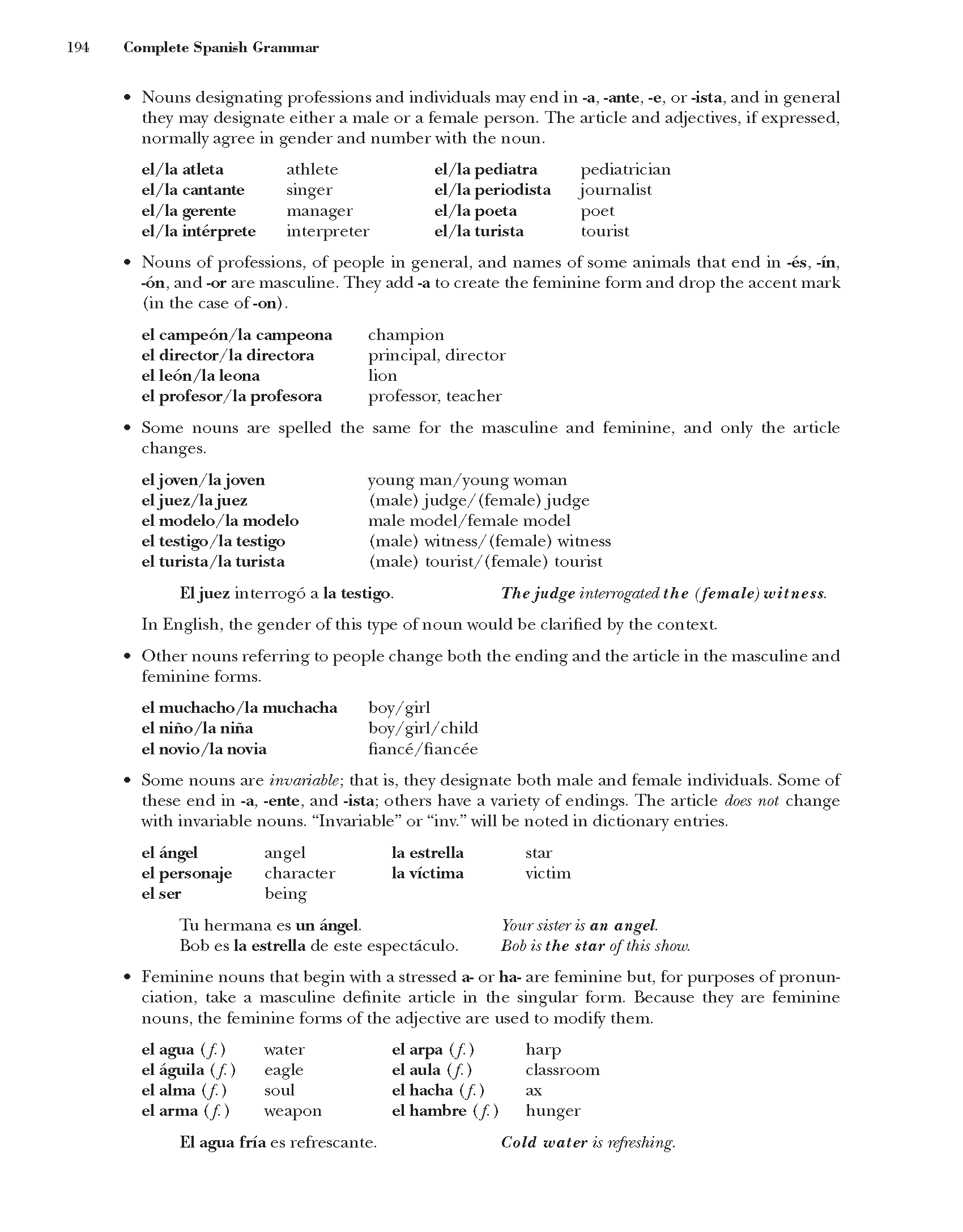CSG205

194 Complete Spanish Grammar
• Nouns designating professions and individuals may end in -a, -antę, -e, or -ista, and in generał they may designate either a małe or a female person. The article and adjectives, if expressed, normally agree in gender and number with the noun.
athlete
singer
manager
interpreter
pediatrician
journalist
poet
tourist
el/la atleta el/la cantante el/la gerente el/la interprete
el/la pediatra el/la periodista el/la poeta el/la turista
• Nouns of professions, of people in generał, and names of some animals that end in -es, -m, -ón, and -or are masculine. They add -a to create the feminine form and drop the accent mark (in the case of -on).
champion principal, director lion
professor, teacher
el campeón/la campeona el director/la directora el león/la leona el profesor/la profesora
• Some nouns are spelled the same for the masculine and feminine, and only the article changes.
el j oven/la joven el juez/lajuez el modelo/la modelo el testigo/la testigo el turista/la turista
young man/young woman (małe) judge/ (female) judge małe model/female model (małe) witness/ (female) witness (małe) tourist/(female) tourist
El juez interrogó a la testigo. The judge interrogated the (female) witness.
In English, the gender of this type of noun would be clarified by the context.
• Other nouns referring to people change both the ending and the article in the masculine and feminine forms.
el muchacho/la muchacha boy/ girl
el nino/la nina boy/girl/child
el novio/la novia fiance/fiancee
• Some nouns are invariable; that is, they designate both małe and female individuals. Some of these end in -a, -ente, and -ista; others have a variety of endings. The article does not change with invariable nouns. “Invariable” or “inv.” will be noted in dictionary entries.
el angel el personaje el ser
angel
character
being
la estrella la \ictima
star
victim
Tu hermana es un angel.
Bob es la estrella de es te espectaculo.
Your sisteris an angel.
Bob is the star of this show.
• Feminine nouns that begin with a stressed a- or ha- are feminine but, for purposes of pronun-ciation, take a masculine definite article in the singular form. Because they are feminine nouns, the feminine forms of the adjective are used to modify them.
el agua (f.) water
el aguila (f.) eagle
el alma (f.) soul
el ar ma (f.) weapon
el arpa (f.) el aula (f) el hacha (f) el hambre (f.)
harp
classroom
ax
hunger
El agua fria es refrescante.
Cold water is refreshing.
Wyszukiwarka
Podobne podstrony:
CSG010 Introdnition Practice Makes Perfect: Complete Spanish Grammar is designed as a tool for revie
CSG107 96 Complete Spanish Grammar Remember that -er and -ir verbs have the same ending. The bus is
CSG107 96 Complete Spanish Grammar Remember that -er and -ir verbs have the same ending. The bus is
CSG107 96 Complete Spanish Grammar Remember that -er and -ir verbs have the same ending. The bus is
CSG215 204 Complete Spanish Grammar Morę About the Uses of Definite Articles in Spanish The definite
CSG187 176 Complete Spanish Grammar Guarden los libros ya. Pu t the books away imm
CSG293 282 Complete Spanish Grammarejercicio l Que clase de relación existe entre los elementos de l
więcej podobnych podstron